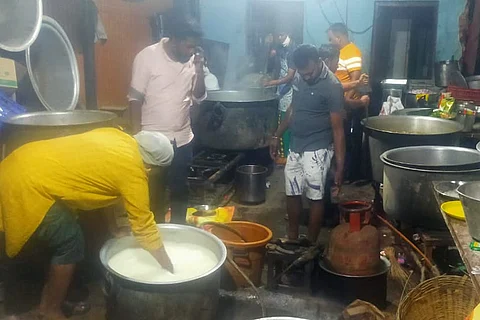

While many were preparing to watch the Republic Day parade on television, Mallu Kumbar was busy cooking along with her colleagues and members of the Karnataka Sexual Minorities Forum. Since Monday night, the LGBTQ group has been cooking food in Bengaluru's Bhoopasandara for the farmers heading to the city to stage protests against the three contentious farm laws passed by the Union government.
“We aimed to cook at least 300 kg of rice and make pulao. We began our work on Monday night because we were all inexperienced in cooking for such a large crowd and had a great amount of work,” said Mallu, the state coordinator of KSMF, a state-level democratic organisation for sexual minority activists.
Different organisations representing the Dalit community, women’s welfare groups and others undertook various responsibilities in assisting the farmers throughout the day. While one team has been busy cooking food, the other is proactively distributing it among farmers on-site.
“A few members of the KSMF group decided to donate some funds and we bought the supplies to cook for the farmers within that amount. Al Kabab Centre provided us with the necessary utensils, water connection and a place to cook for the farmers. I feel honoured that I got a chance to cook for them. They grow the very grains we eat. This is the first time we have undertaken such an initiative,” said Mallu.
Expressing solidarity with the farmers protesting against the central farm laws in New Delhi, farmers in Karnataka held a tractor rally in Bengaluru on Republic Day. Similar rallies were held in all the district headquarters across the state.
The Karnataka farmers named their rally 'Jana Ganarajyotsava Parade' (People's Republic Parade).
Hundreds of farmers from across the state took to the streets in various districts in their own private vehicles instead of driving into the city in their tractors as part of the 'Jana Ganarajyotsava Parade'.
In Bengaluru, local farmers accompanied by those coming from other parts of the state took out a rally from NICE Road junction to Hosakote Toll Junction on Kolar road. A similar module was adopted in every district of Karnataka, where local farmers brought their tractors, while those coming from nearby villages came in private vehicles.
“The injustice being meted out to people in this country and state is not unknown. The farmers' protest has begun a new revolution across the nation. We, the people of the sexual minority community, work as farmers or are farmers’ children. We will stand by the farmers who demand repealing of the farm laws by those who are willing to fight for the greater good and restore the faith in justice. We will carry the legacy forward,” Mallu said.
Elaborating on their stance, Kumbar explained that the farm laws have largely affected the farmers adversely and have pushed them further towards poverty.
“We don’t just want the Union Government to repeal the three farm laws. We also want the Karnataka State Government to roll back the amendments they made to the land laws, which is a challenge for farmers in the state,” added Mallu.
In Delhi, protesters clashed with police, who used lathicharge and tear gas against the protesting farmers. Some farmers deviated from the organised route and entered the historic Red Fort. Protesters broke past barricades with tractors at various border points ahead of the Republic Day parade. Delhi police had given permission for farmers to hold their protests on select routes, but chaos ultimately ensued when farmers began moving towards central Delhi.
Calling the farm laws and land law amendments as “anti-people,” Mallu then spoke on how the recently passed anti-cattle slaughter law had brought a host of issues for the farmers who would sell their cattle to slaughterhouses and earn some money out of it.
“A lot of farmers who could have earned little money from selling their cattle to the butcher shops have now stopped receiving it since no one is buying cattle from them under the fear of being attacked by the mob of cow vigilantes. What will the farmers do of the cattle? The butchers ask them to give them away to state-run cow shelters for free. The government should review their laws and provide the farmers with some respite,” said Mallu, explaining that the laws also in-turn affect the members of different communities, such as sexual minorities.
With PTI inputs